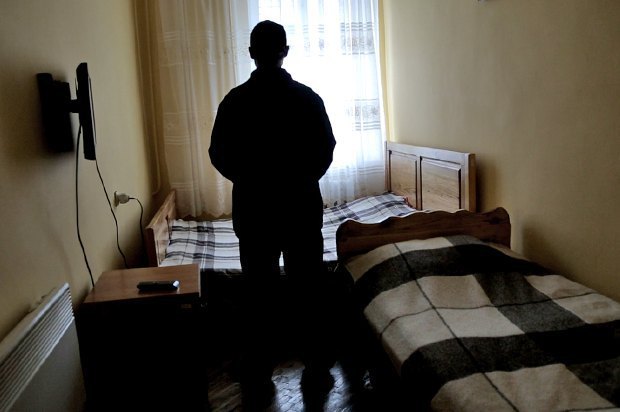
"I was shocked when I saw him after his release. I can’t describe how strong he was. He walked forward without keeping his head down. When he got into the correctional colony, he almost died. Everything bad that could happen to a person, happened to him". That is how the former military describes his close relative Alexander (in order not to identify the family, we do not write the surnames). Alexander served punishment in Berdyansk colony No. 77. Relatives claim that he was raped by prisoners there.
Alexander was an intelligence officer who participated in the battles for Mariupol, for which he received the Order "For Courage". During his service, he was detained along with other military men on suspicion of separatism and transferred to law enforcement officers. He was charged with the illegal detention of a civilian and sentenced to three years. The head of the organization "Legion of Truth", Andriy Lyashenko, considers the verdict illegal and wonders why the soldier was sent to the colony.
"We do not understand how he got into a civilian colony, he should have been sent to a penal battalion (military detention) where soldiers who committed crimes should be held", the human rights activist said.
The military prosecutor's office explained to LB.ua that the penal battalion only holds soldiers who are sentenced to less than two years. Because Alexander was sentenced to three years, he was sent to the civilian colony, as explained by Yana Stekacheva, the spokesperson of the military prosecutor of the Southern region.
23-year-old Alexander arrived at the Berdyansk colony in the summer of 2017. A relative of the former military officer claims that he was beaten in the institution because of his political views.
"He was given injections of a haloperidol drug. He told me that when he was in the medical unit, he was asked if he had fought in the east of Ukraine and after that, he was beaten by other prisoners. When his mother came to see him, she said in tears: "He had bruises even on his ears, his body was covered by bruises, he could hardly move".
Alexander's relative said that he learned about the rape from other prisoners who called him from the colony. Alexander attempted to commit suicide because of the torture, then he was sent to a psychiatric department in another colony. Representatives of the administration denied the facts of rape saying that Alexander got crazy and made everything up.
On October 18, 2018, Alexander was released from custody.
"During the first days, he could barely sleep - at most, only for half an hour each day. Sometimes he forgot his name. The man fought, defended his Motherland, and then paid so much", Alexander's relative said. The mother of the ex-soldier wrote to the prosecutor's office in 2017, but they did not react at that time.
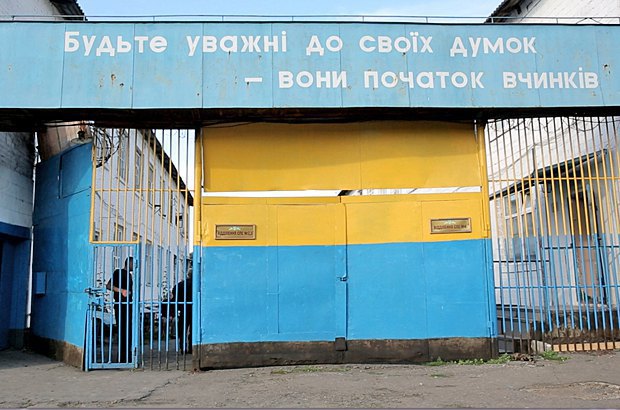
"Conveyor of death"
The Berdyansk correctional colony No. 77 (BCC) has a minimum security level. The institution detains 716 convicts who committed their first minor crime. Most of them are between the ages of 18 and 35.
Human rights activists say that the story of Alexander is the most awful, but not the only case of torture.
"This is a conveyor of death", Oleg Zvily, the leader of the "Alliance of Ukrainian Unity" and a former convict, emotionally described the institution. He claimed that the prisoners are sometimes beaten to death in the institution.
Since 2016, 11 prisoners died (and two at the beginning of this year) in the correctional colony, the administration of the State Criminal Execution Service (SCES) informed LB.ua. The SCES claimed that two prisoners had committed suicide. The cause of other deaths was identified as "illness".
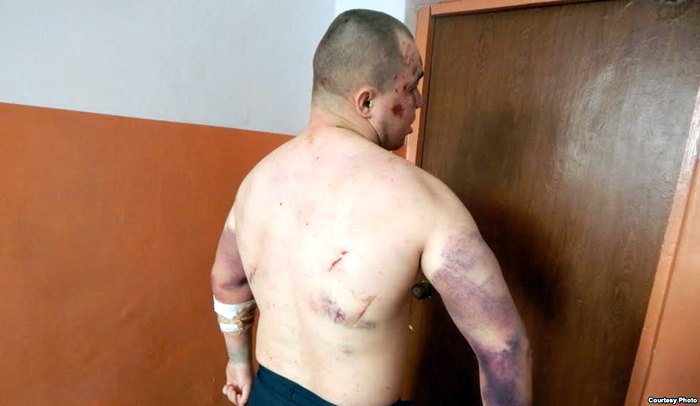
Human rights activists recorded the facts of torture in the correctional colony since 2008. Four years ago, there was a story in the media about the beating of a prisoner by the name of Mykola Molokov. On February 27, 2015, 13 convicts arrived to the colony.
"Scared of rumors about torture, the convicts refused to leave the pickup truck and attempted to cut their veins as an act of protest. The administration of the colony used tear gas and brutally beat all 13 convicts. Molokov was beaten up the most. No employee of the administration was punished for this, and Molokov was prosecuted for committing an offense established by Article 392 of the Criminal Code of Ukraine - "actions that disrupt the work of the correctional institution." The guy was punished with 5 years of imprisonment," said Andriy Didenko, program coordinator for the Kharkiv Human Rights Protection Group at a press conference.
The penitentiary service explained that by attempting to cut their veins, the prisoners "showed signs of disrespect for the administration of the institution." Molokov was accused of inciting other convicts to disobedience. The penitentiary service argued that one of the prisoners hit the supervisor first, so the administration was forced to use force. The Penitentiary Service had recognized the actions of the Berdyansk correctional colony workers as lawful. No one had been fired.
Parents of prisoners asked human rights activist Oleg Zvilly for help during previous years, but he could only advise them to write an application for transfer to another correctional colony because he did not know how to help her. Mothers of prisoners came out this year with evidence of extortion of money. "They just cried and asked for help", Zvilly said. This, he told LB.ua, prompted him to launch a public campaign to protect the rights of convicted persons at the Berdyansk correctional colony.
"You can not say anything, because you will be killed"
Relatives of prisoners described almost the exact same scenario after the convicts entered the correctional colony. Prisoners were beginning to call and ask for parcels or money to be sent to other bank cards.
31-year-old Arthur Monolatiy stayed in a correctional colony for 9 months, now he is in Odessa, his mother Nadiya Tsykolanova explained. The woman got to know about the tortures in the correctional colony during a meeting with her son.
"When I came to him, he kissed my legs, arms, and cried like a child. I could not understand what happened, because he was not a cowardly man. When I removed his socks, his feet were swollen. He said: "Mom, here you can not say anything, because you will be killed," Tsikolanova recalls.
Already during the farewell in the room on the passage, Nadiya Tsykolanova peered into a small hole in the wall.
"I saw how the car stopped, people were unloaded like objects and prison guards began to beat them with sticks," the woman said.
According to Tsikolovova, the family was required to send money and food on a regular basis.
"Every month we must send food products and construction materials to the prison that cost between 1.5-2 thousand hryvnias. Every week there should have been at least two transfers, which cost 5-7 thousand hryvnias. If they do not like something, they beat him," Tsikolanova said. She added that one of the prisoners even forced her to arrange a wedding for him - to send golden rings, dress, costume, and petals of roses.
During one of the telephone conversations, Arthur said that he was promised a conditional release if the family would pay 120 thousand hryvnias. Tsikolanova took a loan and borrowed money from relatives and gathered 100 thousand.
"He has three small children, he needs to live and raise them," said Tsikolanova, who still sent money to the bank cards. According to the calculations of the family, they had spent 300 thousand hryvnias in 9 months.
Arthur was transferred to jail at the time of the trial of another case, where he had time to visit his mother. According to her, his kidneys had been swollen and there was inflammation in his body. However, the family had one more fear: Arthur can return to the Berdyansk correctional colony.
"I'm going to do this for the sake of that (if they even kill me or my son), so that in the future there will be no more crying mothers and their children will not suffer," Nadiya Tsykolanova promises to continue the struggle.
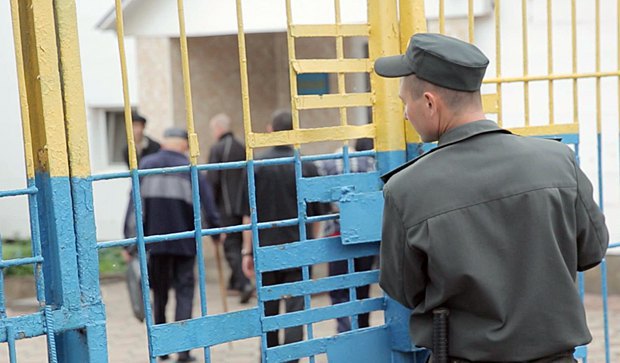
"Every conversation was about money"
Svetlana’s husband came to the Berdyansk correctional colony on January 29 (for security reasons, we do not write their surnames, because Pavlo still remains in the correctional colony). When Pavlo called Svetlana for the first time from the correctional colony, she realized that "it is even worse than what they were told before." Each conversation lasted no more than three minutes, and each time Svetlana heard that there was a man standing nearby who told Pavlo what to say.
"Every conversation was about money - it is necessary to send, send the parcels (he would say). Parcels are very expensive - around 3.5 thousand hryvnias. It was absurd that all the things that he asked to send were already given to him, those are toothbrushes, pastes, shampoos, socks, even some foods", Svetlana recalled. She was asked to send money - each time to a different bank card. The smallest amount was 5 thousand hryvnias.
During the conversation, Pavlo said that he lost 10 kilograms of body weight and that he had an acute illness. "In every conversation, he always said "save me" and in every way made it clear that he was in very bad conditions there. The concentration camp is better in comparison with what is happening there", Svetlana said.
The woman is most afraid of the life of the man who is still in the correctional colony when she tries to save him and publicly spoke about the tortures. During her trip to Kyiv, she became afraid of her own life when she was followed by three unknown men. The only thing that helps her right now is prayer.
"We keep going because prayer calms us down. We understand that if we grow weak, then who will save them? There will be no one to save them", Svetlana said sadly.
"Mom, if you do not give up, then everything will become better", during our conversation with Svetlana, her child rushed into the room.
"I know," the mother answered.
Two more mothers with whom I tried to talk, refused to speak. One of them said that they would communicate if the investigator provided the permission. During the interrogation, the relatives of the convicts signed a non-disclosure agreement of the case file.
"They killed there"
Representatives of "Maidan public control" and "Alliance of Ukrainian Unity" organizations managed to talk with the prisoners themselves. The testimony of two of them was recorded on February 11 in the Dnipro prison, where they were transferred for the trial of their violations. Convicts Sergiy Podlennyuk and Denis Kmetya stayed in the Berdyansk correctional colony from January 9 to February 9.
"I had not suffered so much in my whole life as I experienced that month", Podlomanyuk said.
Both argued that they were beaten for the first time immediately after arrival. Kmetya said he was forced to undress and run naked 20 rounds on the snow and did 500 times sit up.
There was strict "discipline": for the slightest mischief, they were beaten, the delivery from relatives was taken away by the guards, the hot soup was to be eaten in a minute. "You have to understand there: do, as they say, if you do not want to lose your life. There were not only those who were beaten, they were killed there," said Podlennyuk.
The convicts stated that prisoners are not allowed to speak with each other, for violations they were beaten on their lips. Kmetya showed the wounds on his hands. According to him, dirty needles were pinned under their skins, their fingers were pinched with pliers. Among the tortures was also beating with a pipe 30 times on the heels, and drowning their heads in the toilet.
Kmetya said that one of the prisoners had cut the veins on his legs in order to get to the sanitary unit and avoid tortures since he could not stand squatting and standing. After that, the administration tied up the prisoners on the bedside overnight.
After their release from the Berdyansk correctional colony, the torture did not stop, said Oleg Zvily. The human rights activist said that in the correctional colony, mistreatment is recorded in a video which is then used to blackmail ex-prisoners.
"A man clings to a hook and in fact becomes slaves. After release, they are manipulated and are made to commit crimes. They threaten them that they would make the videos public if they tell other people. These people become robots after their release. This is a system built on the tragedy built by criminals in uniform on behalf of the state undercover. I have not seen such a concentration camp. This is the most terrible place that we have in Ukraine," resented Zvily, who called the Berdyansk correctional colony no different than a Gulag.
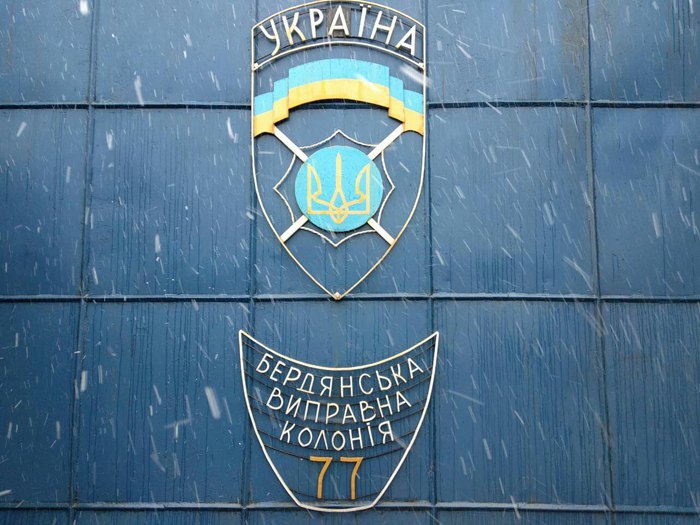
Repaint the correctional colony
The administration of the correctional colony denies any accusations of torture. During the opening day of March 15, Chief Executive Officer Colonel Maxim Chukin told relatives of the convicts: "Workers are very bitter about this topic. Employees are having a nervous breakdown. Everything that is currently stated in the media and by pseudo-defense advocates is not true. This affects our self-esteem not only as employees of the criminal-correctional system but also as men".
The observers said that they believed that the correctional colony was trying to take control of the criminal authorities - to "repaint" the institution. From red, where the correctional colony is controlled by the administration, to black, where they are influenced by a criminal leader, which sets their own rules.
"It is unprofitable for many criminal circles that such a correctional colony exists, therefore, they are trying to infiltrate criminal environment traditions "in different ways in order to infiltrate the correctional colony with drugs and alcohol," a spokesman for the administration said.
Chukin also denied the fact of the rape of Alexander. "We conducted an inspection on this subject, this information was not confirmed," the head of the correctional colony said.
"Injuries inflicted on themselves"
Denis Kmetya was in the correctional colony in the middle of January. There, he said, he got the beating. During his stay, a public prosecutor visited the correctional colony for a check and did not come to the hospital part of the prison.
"They say that the prosecutor is a boss' friend, that’s why the administration doesn’t care," Kmetya said.
It is possible that because of such ties between the Berdyansk prosecutor Nikolai Vasiliev and the chief of the correctional colony Maxim Chukin, there were no violations found. The prosecutor's office of Zaporizhzhia oblast did not want to answer the question because of the friendly relations, referring to the secret of the pre-trial investigation.
The case of former soldier Alexander is being investigated as "causing bodily injuries".
"At the moment, based on the proposal of the staff of the Office of the Prosecutor on the official testimony in the case, the citizen himself, as well as his mother declare that they have no desire to communicate," the prosecutor's office of Zaporizhzhya region told LB.ua press office. The relatives of Alexander and human rights activists who communicate with their family say that the former soldier is in a state of depression and is afraid of disclosure of information.
The prosecutor's office of the Zaporizhzhya region did not want to explain why the case was investigated as a beating, not a rape, and why they did not react from 2017.
"As long as the investigation is conducted, we will restrict ourselves to this comment," told LB.ua spokesman Andriy Rybalchenko.
Berdyansk prosecutor, Alexander Malenko, presented a speech to the city council and said that reports of torture and rape had not been confirmed.
"We conducted a survey among inmates, none of them confirmed the facts. Bruises were found on four people, but they indicated that they had injured themselves", the prosecutor told the local MPs.
According to the statement of the human rights defenders, the State Investigation Bureau (SIB) initiated a pre-trial investigation under articles 127 (2) (torture by a group of persons), 365 (excess of authority or official authority by a law enforcement officer), 364 part 2 (abuse of power or office), 189 (extortion, committed repeatedly, or by a previous conspiracy by a group of persons, or an official using his official position) of the Criminal Code of Ukraine.
The pre-trial investigation is conducted by the territorial department of the SIB in the city of Melitopol, headed by Denis Kerman. Before SIB, Kerman worked at the prosecutor's office of the Zaporizhzhia region. Kerman and Vasilyev visited the correctional colony in 2014, then there were no violations found. Spokeswoman of SIB Angela Ivanova said that she could not comment on Kerman's previous job.
"No one is left out now. The grounds for such removal are not currently detected by the investigators," Ivanov said.
The SIB also sent to the Criminal Service an appeal from activists requesting the transfer of eight convicts who alleged torture from the correctional colony.
The State Commission for Internal Affairs conducted an official investigation and did not find any violations, Chukin still holds the position.
"There is no confirmed information on the presence of torture in the institution," such as the answer to LB.ua's comment request.
---
Although relatives have already been questioned by investigators, they are afraid that law enforcement may intervene in the investigation.
"An investigator, who interrogated us, tried to distract us from our testimony. My words were distorted as if I had decided to give them voluntarily, not on demand. This interrogation was like moral torture. At one point, I have the impression that I'm guilty of it. An unpleasant impression also after communicating with representatives of the General Prosecutor's Office. This informal meeting made us even more disappointed. There is no trust. It seems that the situation is hopeless, " said one of the relatives on anonymous terms.
Andriy Lyashenko said that the General Prosecutor's Office had checked the correctional colony on March 20, and found no violations. However, relatives of prisoners decide not to surrender and promise to continue to demand an unbiased investigation.








